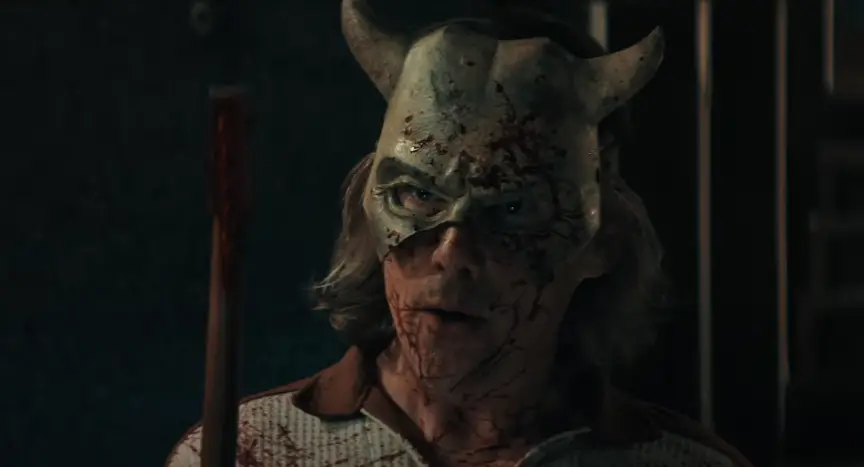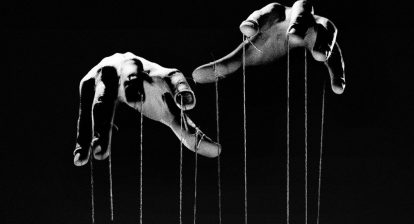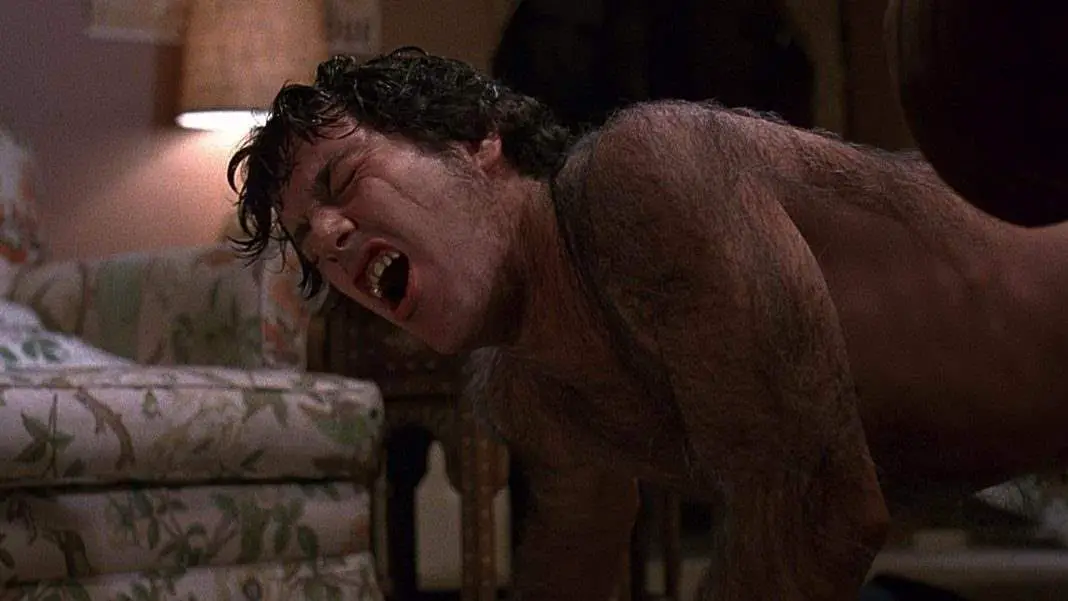In the run up to the release of The Black Phone, the latest from Blumhouse and Sinister duo Scott Derrickson and C. Robert Cargill, their returning star Ethan Hawke waxed lyrical about how difficult it was to break bad and finally play an out-and-out villain. Maybe there was too much anticipation, or perhaps it’s the fact the villain in question bears the unintentionally hilarious moniker The Grabber, but Hawke’s turn to the dark side doesn’t exactly convince. Despite a collection of Savini-designed creepy masks and a fey affectation that grates almost immediately, Hawke’s ruthless child killer reads more troubled than dangerous–-the Child Catcher he ain’t. In fact, Bughuul, the Jim Root looking dude who terrorized Hawke and his family in Sinister, posed more of a threat to little ones than The Grabber, whose flair for the dramatic frequently reads like treading water while he figures out what to do next. Compounding the issue, he’s barely in the film.
The Black Phone is doing well at the worldwide box office, which is always wonderful to see for any horror movie–even one as facile as this–but it’s worth remembering the Friday night multiplex crowd will pay to see any old dross provided it contains the requisite jump scares. And boy, is Derrickson’s film loaded with jump scares. Or rather jump scare since it’s the same one repeated over and over–a dead child slowly emerges from the shadows–until you can practically set your watch to it. Unfortunately, as is increasingly becoming the case with mainstream horror movies, the trailer gives most of its alleged surprises away. It doesn’t matter all that much, though, since lead character Finney (a likeable Mason Thames) never seems to be in any believable danger. Nothing can realistically happen to him, or the film will be over, so, again, much of the action feels like time wasting.
Finney is arguably somewhat safer in The Grabber’s dingy, blood-stained basement. At home, his father (Jeremy Davies, who can play a part like this is in his sleep and deserves better) beats the living hell out of Finney and plucky sister Gwen (Madeleine McGraw, elevating a questionable script with a performance full of gumption and sass). One of these moments, a sustained sequence during which a distraught Gwen is hammered with a belt–nothing is made of the fact their father and The Grabber use the same weapon, one of numerous missed opportunities–goes on for far too long. Likewise, scenes of kids being bullied and fighting each other in school have a sadistic, cruel edge to them that isn’t helped by Brett Jutkiewicz’s sludgy cinematography. Jutkiewicz shot Ready or Not and the recent fifth entry in the Scream series, both of which were rich with color and depth, so we can only assume he was instructed to make the world of The Black Phone look as off-putting as possible.
Did You Know? Wicked Horror TV Has Classic and Independent Horror Films Available to Stream for Free!

The film is inexplicably set in 1978, but besides the costumes and lack of technology there’s nothing to place it during that time period. The Texas Chain Saw Massacre is name-dropped twice, which seems like an odd choice considering Halloween came out in 1978 and is arguably a much closer comparison than Tobe Hooper’s masterpiece which, crucially, was horrifying but still looked terrific. The most glaring difference between The Black Phone and those two bonafide classics is that, when the time comes to focus on the killer, Derrickson and Cargill lose their nerve. For much of the movie’s first act, we’re subjected to horrific violence against children, but once the actual child murderer shows up, the brutality comes to an abrupt halt as Finney and The Grabber engage in an increasingly tiresome back and forth, while the former uses the spirits of previous victims to figure out an escape route.
The Black Phone is based on the short story of the same name by Joe Hill, aka Stephen King’s son. Hill’s tense, sharply focused tale keeps the reader on their toes throughout, getting the job done with ruthless efficiency. But the movie adaptation’s flabbiness robs the story of its enigmatic quality by overexplaining everything and adding a whole bunch of superfluous material that isn’t necessary. There are also head-scratching inconsistencies throughout, some of which develop into plot-holes so big you could drive The Grabber’s bizarrely attention-grabbing van–has nobody noticed it trundling around town!?–through. The potential use of a barred window as a possible escape route is particularly badly mishandled, while the fact Finney has a sharp pen, with which he injures his kidnapper upon initially being taken but doesn’t ever think to use again, is egregious in its short-sightedness. The camera even lingers on the object in Finney’s hand when he’s first thrown down into the basement, seemingly signifying its importance.

Worse still is the treatment of Gwen’s psychic powers, which have been inherited from her mother, who killed herself because of them (eek). When we first meet the potty-mouthed little girl (snore), the police are questioning Gwen about what she knows about The Grabber’s plans. Although they’re initially circumspect, the cops subsequently turn to Gwen repeatedly for help with the case–let that sink in; a little girl, claiming to have supernatural powers, becomes law enforcement’s go-to assist on a serial killer case. Weirdly, The Grabber appears to have been terrorizing their North Denver suburb for months, but nobody takes any action to stop him. Moreover, kids are frequently allowed to wander the streets alone, including at night, when Gwen ventures out on her bike based on a hunch she’s just received in a dream. There’s also a strange religious element to the little girl’s powers that is misjudged at best, moralistic at worst. Despite the fact The Black Phone tries really hard, at least at first, to establish itself as a serious horror movie for hardcore genre fans, the action is anodyne and uninspired, the set-pieces drab and repetitive. There’s nothing new here apart from Hawke’s mannered performance, which seems to be causing him more pain than his victims.
See Also: ‘X’ is Brutal, Surprising, and Sex Positive [Blu-ray Review]
The main problem is that Finney is never in any real danger, so there’s no tension wrought from his predicament. If anything, it feels excruciatingly drawn out and predictable. Furthermore, the supernatural twist consistently chafes against the true crime elements. The kids who call Finney on the titular handset deliver reasonably helpful advice, but the movie grinds to a halt whenever we’re stuck in that basement with him. Derrickson doesn’t play with the shadows at all, either–another missed opportunity to do something dark and interesting. Finney’s terror should be palpable, but Thames’s best efforts are hampered by a lacklustre screenplay and dodgy direction. McGraw fares better, but she’s got the easier task, running around town trying to figure out where her brother is, and the punchier lines too. With muted cinematography and little attempt to evoke the feeling of the time, or even movies set during that time, The Black Phone resembles little more than yet another try-hard and highly derivative example of the kind of content Blumhouse churns out on a depressingly regular basis. There’s nothing memorable about this movie. In fact, it even pales in comparison to Sinister, which had its issues but at least also had the courage of its convictions. Disappointing.
WICKED RATING: 2/10
Director(s): Scott Derrickson
Writer(s): Scott Derrickson, C. Robert Cargill, Joe Hill(based on the short story)
Stars: Ethan Hawke, Mason Thames, Madeleine McGraw, Jeremy Davies
Release date: June 24, 2022
Language: English
Run Time: 103 minutes




